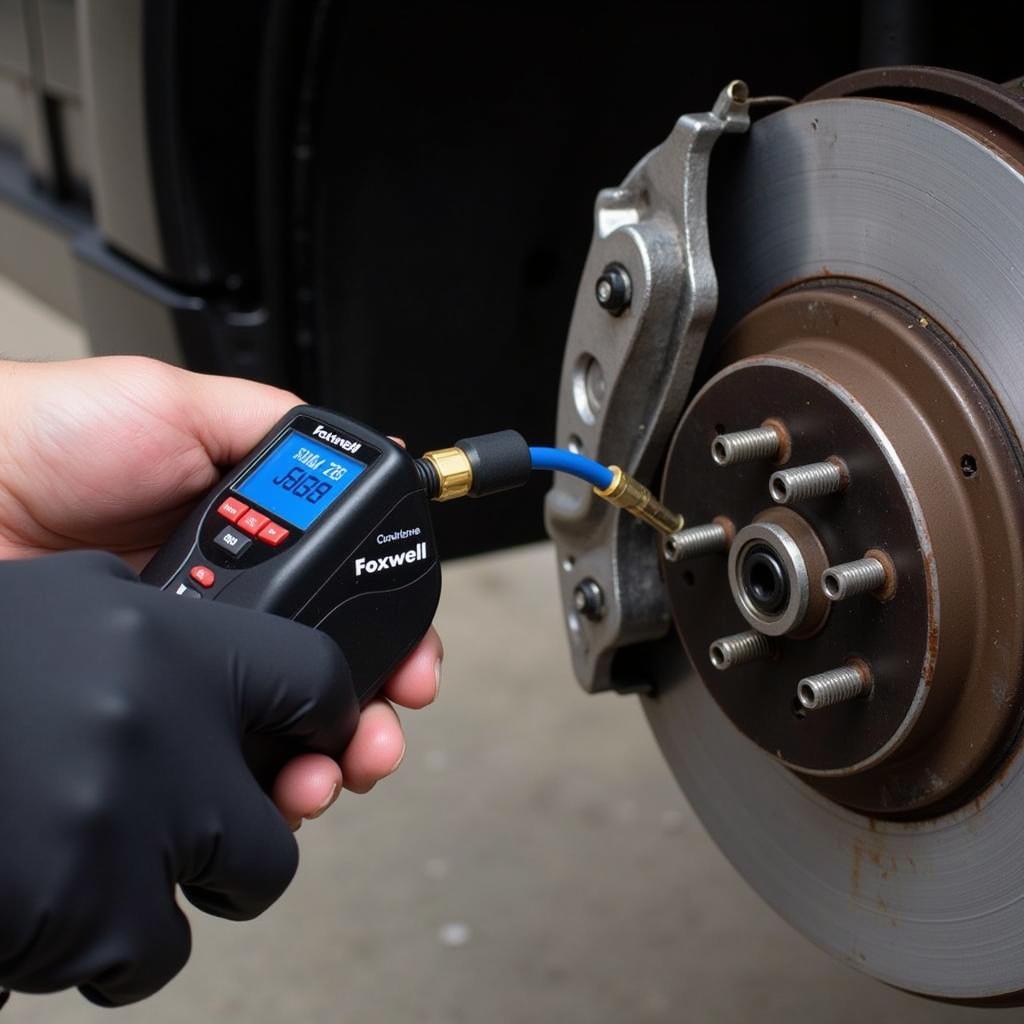A Foxwell Pressure Tester is an essential tool for any mechanic or car enthusiast who wants to diagnose and repair automotive issues related to pressure. This article delves into the world of Foxwell pressure testers, providing valuable insights on their functionality, benefits, and how to use them effectively. foxwell digital pressure tester offer a combination of precision, user-friendliness, and advanced features that simplify the process of identifying pressure-related problems in various vehicle systems.
Why Pressure Testing Matters in Automotive Diagnostics
Pressure testing plays a vital role in diagnosing various car problems. It helps identify leaks, blockages, and other irregularities in different vehicle systems, including:
- Cooling System: Detecting leaks in the radiator, hoses, water pump, and engine block.
- Fuel System: Identifying leaks in fuel lines, injectors, and fuel pressure regulators, ensuring optimal fuel delivery and engine performance.
- Braking System: Finding air in brake lines, faulty master cylinders, or leaking wheel cylinders, ensuring safe and efficient braking.
- Emissions System: Testing the integrity of the Evaporative Emission Control (EVAP) system to prevent fuel vapor leaks, contributing to environmental protection.
By pinpointing these issues early on, pressure testing helps prevent costly repairs, improves vehicle performance, and ensures safety.
The Advantages of Using a Foxwell Pressure Tester
Foxwell pressure testers stand out for their accuracy, ease of use, and versatility. Here’s a closer look at their advantages:
- Digital Display: Provides clear and precise pressure readings, eliminating the guesswork associated with traditional analog gauges.
- Multiple Adapters: Comes equipped with a comprehensive set of adapters, making them compatible with a wide range of vehicle makes and models.
- Durable Construction: Built to withstand the demands of a professional workshop environment, ensuring longevity and reliable performance.
- Additional Features: Many Foxwell pressure testers offer advanced features like data logging, pressure limits setting, and bleed functions, enhancing their diagnostic capabilities.
How to Use a Foxwell Pressure Tester Effectively
Using a Foxwell pressure tester is straightforward, even for beginners. Here’s a step-by-step guide:
- Identify the System: Determine the specific vehicle system you need to test (e.g., cooling system, fuel system).
- Select the Adapter: Choose the appropriate adapter from the kit that matches the test port on your vehicle.
- Connect the Tester: Securely connect the chosen adapter to the test port and the pressure tester to the adapter.
- Apply Pressure: Follow the manufacturer’s instructions to apply pressure to the system. This usually involves using a hand pump integrated into the tester.
- Monitor the Gauge: Closely observe the digital display on the Foxwell pressure tester for pressure readings.
- Analyze the Results: Compare the readings to the manufacturer’s specifications to determine if the pressure is within the acceptable range. A significant drop or fluctuation in pressure usually indicates a leak or blockage.
- Locate Leaks: If a leak is detected, visually inspect the system for signs of leakage such as fluid drips, stains, or wet spots. You can use a shop light and a mirror for better visibility in tight spaces.
Common Applications of a Foxwell Pressure Tester
Beyond leak detection, Foxwell pressure testers prove valuable in various automotive tasks:
- Bleeding Brake Lines: Effectively removing air bubbles from brake lines to ensure a firm brake pedal and optimal braking performance.
- Testing Fuel Pressure: Diagnosing fuel pump issues, clogged fuel filters, or faulty fuel pressure regulators by measuring fuel pressure.
- Checking Cylinder Compression: Using a specialized adapter, a pressure tester can help assess engine health by measuring cylinder pressure.
 Mechanic Bleeding Brakes with Foxwell Pressure Tester
Mechanic Bleeding Brakes with Foxwell Pressure Tester
Tips for Choosing the Right Foxwell Pressure Tester
Selecting the right pressure tester depends on your specific needs and budget. Consider these factors:
- Types of Vehicles: If you work on a variety of vehicles, opt for a tester with a wide range of adapters.
- Pressure Range: Ensure the tester’s pressure range aligns with the systems you intend to test.
- Additional Features: Decide if advanced features like data logging, pressure limit setting, or bleed functions would be beneficial.
Conclusion
Investing in a foxwell tech can save you time, money, and frustration in the long run. By accurately diagnosing pressure-related issues, you can ensure the optimal performance, safety, and longevity of your vehicle.
For any assistance or inquiries regarding Foxwell pressure testers, please contact ScanToolUS at +1 (641) 206-8880 or visit our office at 1615 S Laramie Ave, Cicero, IL 60804, USA.
